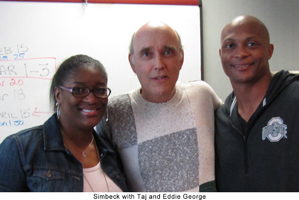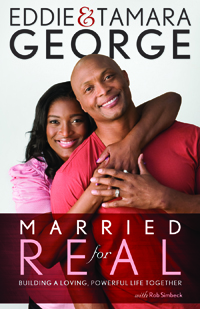My Life as a Ghost
Eddie and Taj George needed a ghostwriter; Rob Simbeck was their man
I like surprises. I’ve never had a three-year plan or even a one-year plan. As a writer, I do the best I can with each job in front of me and sort through projects as they come, looking for those that are interesting and fun. So I was just fine with a bit of mystery when I got a call in October 2010 from the United Methodist Publishing House asking if I would work with a celebrity couple who wanted to write a book together. I do a lot of ghostwriting work for this house, including a book co-written with former Dollar General CEO Cal Turner and his pastor, Howard Olds. “We liked what you did with that one,” the editor told me, “and we’d like you to do another.” The hitch: “We can’t say who it is until they sign the contracts.” My response: “No problem.”
I like tackling projects that take me where I haven’t gone before. I signed on to write the fiftieth-anniversary history of the Nashville Symphony when the number of symphonic performances I’d attended in my life was in single digits. This project sounded a lot easier. After the usual back-and-forth about pay, the editor and I arrived at a figure I found acceptable—a flat fee with no royalty split. She also agreed to my normal request for a third of the payment when we sign the contract, a third at the estimated halfway point, and a third on approval of the completed manuscript. “OK,” I said. “Let me know when you’ve got the contracts signed.”
 So now we had ghosts on both sides of the equation. I ran the possibilities through my head. Reba and Narvell? Nah, not Methodists. Vince and Amy? Keith and Nicole? Phil Bredesen and Andrea Conte? As my guesses got more out there, I figured I’d better just wait. It was several weeks before my contact called again. “Paperwork’s done,” she said. “It’s Eddie and Tamara George.”
So now we had ghosts on both sides of the equation. I ran the possibilities through my head. Reba and Narvell? Nah, not Methodists. Vince and Amy? Keith and Nicole? Phil Bredesen and Andrea Conte? As my guesses got more out there, I figured I’d better just wait. It was several weeks before my contact called again. “Paperwork’s done,” she said. “It’s Eddie and Tamara George.”
That’s when I knew the book would be interesting. Eddie is a superstar, a running back with more than 10,000 career yards, and he made Super Bowl and Pro Bowl appearances with the Titans. He’s now doing radio, running a business or two, and acting, among other things. Tamara Johnson-George, who goes by “Taj,” sang with Sisters With Voices, one of the bigger R&B groups of the ‘90s. She’s also done a stint on Survivor and written a book of her own. Taj’s outline for this book was bare bones, just two or three pages, but I could see why the UMPH had taken it on. Each chapter would deal with a big potential stumbling block to marriage—money, sex, the past, faith—and provide an in-depth look at how the Georges handled each. There would be a lot of real-life information, and it’s always great to have two highly visible people promoting a book.
I sat down with the outline, came up with all the questions and areas of discussion I could think of, and asked for as much time as the Georges could give me. It can be tricky to ghostwrite a book for one person; writing for two voices presents even more challenges. I suggested an organization that had worked well with the Turner/Olds book: to open each chapter with a running narrative ostensibly written by both people, followed by each person’s individual commentary about the same topic. It’s a way to highlight the life experiences and bring out the personalities of each—and, in this case, both the male and female views.
Eddie’s schedule was going to be rough through the end of football season, but Taj and I would be able to get started soon. In the meantime, I had other projects to work on.
So now we had ghosts on both sides of the equation.
I got my start as a ghostwriter almost accidentally. It began with an article I submitted to Guideposts, a magazine that features uplifting stories about people dealing with life turnarounds. I had quit drinking years earlier and thought an account of my recovery might make a good piece for a magazine founded by Norman Vincent Peale.
Wrong: “Stories about recovery from alcohol and drugs are a dime a dozen,” the editor wrote back. “We can’t use it. But since you live in Nashville, see if you can find a country singer who will let you ghostwrite her story.”
As a bio writer and radio interviewer, I’d worked with almost everybody in country music, but my first thought was Reba McEntire. Something in her life had to fit the bill. I called her people, and they gave me ninety minutes with her—it doesn’t hurt, when you’re asking for time with a star, to mention that Guideposts has a circulation of over three million—and we were off to the races. I ghostwrote the story of how Reba’s mother convinced her, when she was nineteen and getting cold feet, to go through with her first Nashville audition. It made the cover.
 Since then I have ghostwritten many Guideposts stories for, among others, Kathy Mattea, Clay Walker, two women who flew around the world in a two-seat plane, and the cop who shot a man who was shooting up a school-board meeting in Panama City, Florida. (That one appeared last December.) My name has never appeared in the magazine, but the checks are very nice.
Since then I have ghostwritten many Guideposts stories for, among others, Kathy Mattea, Clay Walker, two women who flew around the world in a two-seat plane, and the cop who shot a man who was shooting up a school-board meeting in Panama City, Florida. (That one appeared last December.) My name has never appeared in the magazine, but the checks are very nice.
I started ghostwriting books when, during a slow period in the ’90s, I stopped by every book publisher in Nashville to leave my resume—it was on paper and I dropped it off at the front desk—to explain that I had a lot of experience as a newspaper and magazine editor and would like to be considered for book-editing projects. Then work picked up again, and I forgot about it. Three years—three years!—later I got a phone call from Ron Kidd, senior editor at the United Methodist Publishing House. “I was cleaning out my files,” he said, “and I ran across your resume. Let’s go to lunch.” I went, and it was pleasant, but nothing happened for a year. Then he called again and said, “I’ve got a book for you.”
Since then, I’ve edited half a dozen books for that house. For other publishers, I’ve worked on the autobiography of Lily Isaacs, a bluegrass/gospel singer whose parents survived Nazi concentration camps, and that of Arnie Deckwa, who came to Nashville as a singer and left ten years later as head of a successful food business. As I waited for time with the Georges, I was already at work on two others: a second Cal Turner book and the autobiography of Randall Baskin, a dirt-poor, Depression-era farm boy from Rutherford County who wound up owning his own insurance company.
When we finally sat down together, I found Taj an absolute joy to talk to. She’s a force of nature, and she wanted to be completely open about her life, her past, what had worked for her and Eddie and what hadn’t, so readers would get a true-to-life handbook about marriage. (For readers interested in the technical aspects of this work, I’ll mention that I recorded the conversation, but I can type about as fast as anyone can talk, so I typically leave interviews with essentially verbatim transcripts.) As I reviewed my notes the next day, I knew we had something good. Taj had great stories—a tough childhood, turbulent young-adult relationships, huge stardom, and a big fall with Sisters With Voices, and the building of a relationship with Eddie through any number of challenges.
When Eddie’s schedule calmed down, he and I got together and did the same thing. He talked his way through his own troubled childhood, redemption through sports and a handful of role models and supporters, the Heisman Trophy at Ohio State, that stellar career with the Titans, marriage to Taj, and career readjustment after the pros. Eventually the three of us got together to talk through what we had—and I made sure to get a photo of us for posterity and Facebook—and then I went off to start writing.
Over the years I’ve found that a good paycheck balances out relative anonymity quite nicely.
The editor suggested questions at the end of each chapter designed to help readers and their significant others assess and work on their relationships, and I wrote those myself. I also expanded some of the discussions in each chapter. (Whenever I didn’t have Taj and Eddie’s thoughts on the matter in my notes, I dropped them an email for clarification.) There were enough of my own embellishments in the first draft that I expected it to get a lot of red pencil, but it didn’t; somehow this one went smoothly from discussion to page. That’s not always the case: When I worked with Turner and Olds, for example, each chapter had to please four people—Cal, Howard, and two editors—and I did a lot of rewriting. Here, everything flew pretty much as I sent it, even my questions at the ends of the chapters. I felt like I’d channeled Dr. Phil or, at least, Dear Abby.
Fairly early on in the process—after we’d signed the contracts but before I finished a draft—I asked the United Methodist Publishing House to include my name on the cover. Many celebrities who hire ghostwriters won’t consider an “as told to” credit, and Taj and Eddie could very well have said no. They didn’t, and that’s a great thing for a writer’s ego and portfolio. But even when my name doesn’t appear on the cover, I’m generally mentioned in the acknowledgements, and over the years I’ve found that a good paycheck balances out relative anonymity quite nicely.
Now that the book is out, I’m looking forward to seeing Taj and Eddie in action at their first signings in Nashville. Taj recently wrote a piece for Guideposts, and I know both she and Eddie have a lot more to say in book form. I’m sure we’ll hear more from them.
As for me, I’m ghosting another book, this one for a publishing executive, and editing yet another for the Methodists. Both are due before the end of February, and I’m hoping to get some free time after that for some pet projects I’ve had on hold for years—the ghosting business has been good and steady for a long time. I’ve never felt anything less than enthusiastic about these projects. I love digging into people’s lives and trying to get inside their heads enough to write the way they talk—and the way they think. It’s a learned skill, an offshoot of a lifetime of listening, and I enjoy it.
Everyone’s got a story, but it takes a good eye, a lot of work, and the right combination of words to make that story interesting to others. And, luckily for me, there are a lot of people out there who need a ghost.
Eddie and Tamara George will discuss Married for Real at Barnes & Noble Booksellers in Brentwood on February 7 at 7 p.m., and at the Hermitage Kroger on February 8 at 6 p.m.


